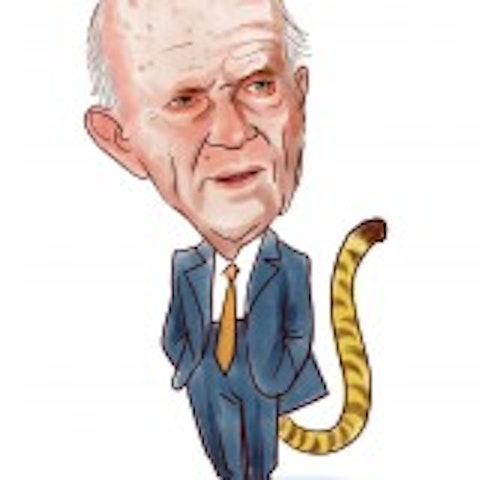The legendary Julian Robertson- who not only became a billionaire himself through his success at Tiger Management, but also groomed several “Tiger Cubs” who have gone on to become successful hedge fund managers themselves- has filed his 13F for the first quarter of 2013. These filings disclose many of an investor’s long positions in U.S. stocks as of the end of the quarter. We track these filings as part of our work developing investment strategies (we have found, for example, that the most popular small cap stocks among hedge funds outperform the S&P 500 by 18 percentage points per year on average) but also like to see what big names such as Robertson did over the previous quarter. We have compared his most recent 13F to the one from the end of December (see Robertson’s previous filings) and here are three trends which investors might find interesting:
Dumping Apple. Robertson had cut his stake in Apple Inc. (NASDAQ:AAPL) by 58% during Q4 2012, but it had still been one of his five largest holdings by market value at the beginning of this year. Between January and March, however, he kept selling and owned no shares by the end of March. Apple Inc. (NASDAQ:AAPL) had lost its place as the most popular stock among hedge funds to AIG in the fourth quarter (check out more of hedge funds’ favorite stocks). Apple Inc. (NASDAQ:AAPL)’s stock price has done poorly recently, and it currently trades at 10 times earnings whether we consider trailing results or forward projections from analysts (and that doesn’t account for the fact that a sizable portion of the company’s value is composed of cash). Shrinking margins have caused earnings to decline even as revenue rises, and the current valuation implies that markets are expecting net income to go even lower. Peer Google Inc (NASDAQ:GOOG) is now Robertson’s largest position by market value as he increased his stake somewhat and the stock saw a large gain in price during the quarter.

And yours, too. The 13F reported that Robertson initiated a position of about 850,000 shares in tax prep company H&R Block (NYSE:HRB). The stock has nearly doubled in the last year. This places it at a valuation of more than 20 times its trailing earnings, but analyst consensus is that the fourth quarter of its fiscal year, which ended in April (unsurprisingly this is by far H&R Block’s biggest quarter and often the only profitable one of its year) will show nearly 30% EPS growth against last fiscal year’s Q4. The forward P/E is 15, which is quite a bit lower but would require further growth from that point. H&R Block pays a dividend yield of almost 3%. Billionaire (and Tiger Cub) Andreas Halvorsen’s Viking Global has been a major shareholder in the company (find Viking Global’s favorite stocks).
We’re not sure that we’d follow Robertson’s lead in selling Apple Inc. (NASDAQ:AAPL), but his bearishness on the stock is certainly something shareholders in the company should be aware of. We’d avoid Moody’s Corporation (NYSE:MCO) and McGraw Hill Financial Inc (NYSE:MHFI) for now- the former seems pricy, and we’d like to see at least one quarter of results from the latter as it is currently composed (though the sale of the education unit could lead to improved efficiencies as management is better able to concentrate on the operations of the financial information business). H&R Block looks interesting, though of course its attractiveness is dependent on its results from last quarter and it might not be too wise to trust in sell-side estimates.
Disclosure: I own no shares of any stocks mentioned in this article.


